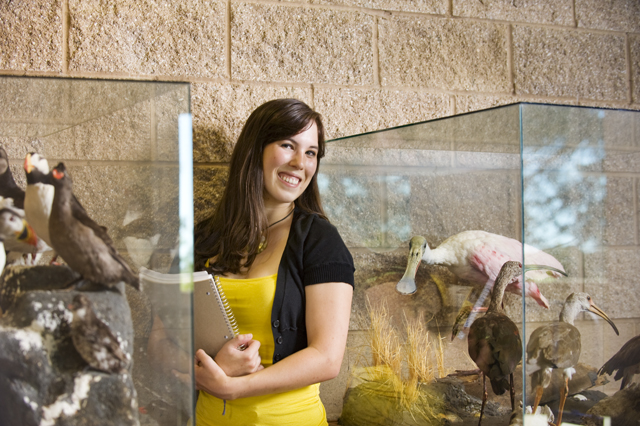
At 20 years old, Helbig has spent nearly half of her life caring for animals. She’s pursuing that passion by becoming a veterinarian. “I’ve been riding horses since I was seven, and being a veterinarian is just something I’ve always wanted to do,” she says. “I’ve always wanted to have animals nearby.”
At age 13, when Helbig entered high school, she began to volunteer with the WildCare center in San Rafael, Calif. Although her high school only required 20 hours of volunteer service, Helbig dedicated herself to the center for seven years as a volunteer, an intern and eventually a paid employee.
“One day, my boss pulled me aside and said ‘I have to talk to you,’” Helbig says. “It was really scary.” But instead of disciplinary action, Helbig’s boss granted her one of the greatest opportunities she had ever had.
“My boss told me I’d been nominated to go to Louisiana,” Helbig says. “She said, ‘You’ll be working 12-14 hour days with one day off for three weeks minimum. You’ll get everything paid for and you’ll be making more there than you do here.’”
Although hesitant at first, Helbig took the opportunity. “It was set up in a way that you really couldn’t say no to it,” she says.
Once in Louisiana, Helbig settled in to her long, eventful days. “I was supervisor of the dry room where the birds come right after they’re washed,” she says. There, she would tube feed the birds Emeraid—a specially formulated food for critically ill animals—and check to see that their temperatures were at least 100 degrees. “If I got a bird with a body temperature under 100 degrees, that bird was considered to be in critical condition.”
The center in Louisiana was set up in a large warehouse. “The whole place had this smell of rotten fish, oil, bird droppings and Dawn soap,” Helbig says. “The birds would come from ‘Oiled World’ to ‘Wash World,’ to ‘Dry World,’ to ‘Clean World.’ That’s what we named the different areas in our center.”
For the next three weeks, Helbig’s world was one of almost non-stop activity.
“Between 10 a.m. and 5 p.m., I would be getting a bird every 15 minutes that I’d have to tube and temp. And then I’d have to re-tube and re-temp those same exact birds every hour,” she says. “After 6 p.m., I’d have to work until at least 8 p.m. to make sure I rechecked all the birds and then do paperwork.”
Her paperwork consisted of keeping a chart for every animal she cared for, recording the times she monitored them, the temperature of each animal and the amount of times she tube fed them all. “When you’re working with 30 to 50 birds on average, that can be a lot of paperwork,” she says.
“And then, between 7 a.m. and 10 a.m.,” she says, “I would have to move all the birds I got the previous day to ‘Clean World,’ which means I’d have to weigh them and tube them all again.”
Despite the exhausting work and long days, Helbig enjoyed her work. In addition to the feeling that she was making a positive impact, she was also able to work with closely with wildlife. “You get to see how beautiful and how powerful they are with your own eyes,” she says.
While working in Louisiana, Helbig cared for a wide variety of oiled sea birds, including laughing gulls, white and brown pelicans, snowy egrets and roseate spoonbills.
Next summer, Helbig will participate in a wildlife internship in Africa. “My best friend and I got accepted to shadow Wildlife Managers for a month at Antelope Park in Zimbabwe,” she says. “They rehab lions and have lions on their reserve, but it’s non-paid and it costs a lot of money.” She is currently looking for work with veterinarians in Humboldt County as well as seeking private support to pay for her internship fees.
For more information, contact Stephany Helbig at sph17@humboldt.edu.